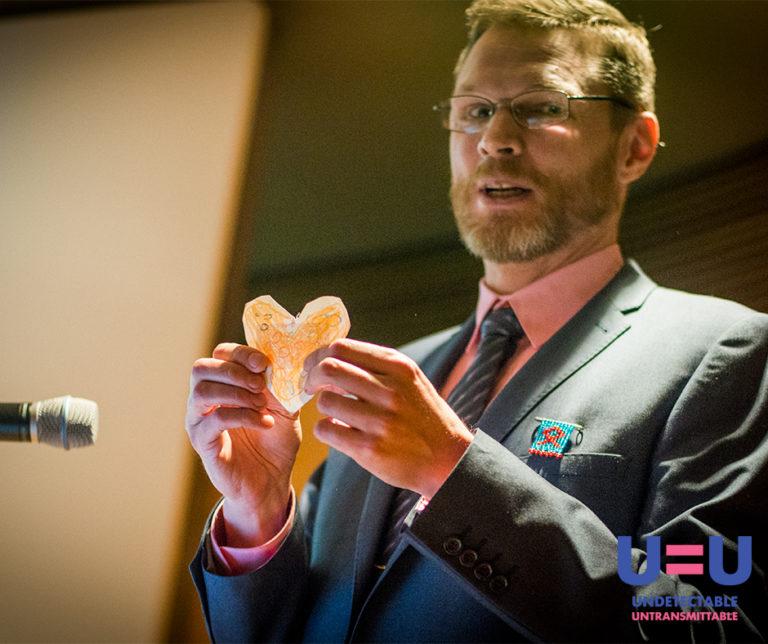
This is the second part of the two U=U articles focused on stigma. We interview Tapani Valkonen who is working as project coordinator and sexuality counsellor at Hiv-Finland.
Stigma in relationships
In the first part of this article, we wrote about Finnish legal praxis as an example of a social structure that can maintain stigma. However, Tapani Valkonen also points out how Finnish law also protects people who live with HIV when it comes to discrimination. The actual problem is, how slowly attitudes finally change.
“If I asked someone, do you discriminate against people living with HIV, they would reply ‘of course not’. The law against discrimination is meant to protect people living with HIV but it doesn’t protect them from negative attitudes that are based on outdated knowledge”, Valkonen emphasizes.
Men who have sex with men are more vulnerable to HIV than the general population in Finland. Meanwhile the prejudiced attitudes can be recognized within gay communities.
“As a gay man I have wondered whether the gay community would exclude someone who has gotten infected with HIV? At least only few have the courage to talk about their HIV status. Perhaps the internalized stigma keeps people from talking about it openly. However, the society people are living in, with discriminative interpretations of the law, is the cause of the internalized stigma. This feels unreasonable because these people have done nothing abnormal compared to others.”
The discrimination is often indirect. It can be pointed out in profiles when we look at different dating sites for instance.
“Users demand their dating partners to be healthy or ask about their health. What do these demands tell us about the users themselves?”, Valkonen wonders.
Encountering and processing the stigma
Tapani Valkonen is not only working at HIV Finland but he also lives with HIV. He has experienced the stigma around HIV and it took him over ten years to process it.
“The stigma and negative valuations around HIV took me a long time to process and finally live openly with HIV. Only now after 15 years I feel like I’m living a full life.”
It is possible to live a healthy and full life with HIV, especially when HIV is diagnosed early so that treatment can be started.
“An HIV positive person on HIV medication can be healthier than an HIV negative person. Their health is regularly monitored within the healthcare system.”
However, good physical health only tells a part of the story of a person’s wellbeing. The experienced HIV related stigma may have tragical consequences for the person’s mental health.
“The delay in discussing the efficacy of HIV treatment has taken a great toll on many people’s mental health, perhaps even their lives”, Valkonen ponders. For Valkonen peer support has been invaluable and has helped him accept the chronic condition he is living with.
“With their support I have been able to forgive myself for the reality that I have HIV. Personally, I think that in order to move past the hurdles I have discussed, I as an HIV positive person must understand and accept that people who discriminate against us, do so out of fear. Otherwise I would be stuck on that island called Seili where they wanted to isolate us in the beginning of 80’s.”
Advocating for human rights is at the core of the work HIV-Finland and U=U campaigns globally do.
” Fighting for human rights is ongoing and we expect support from a united front of NGOs and particularly from the LGBTQI+ community. In Finland the HIV epidemic is under control, exactly because of the inclusion of the communities affected by HIV and of people living with HIV in the planning of HIV prevention programs.”
When advocating and spreading the message of U=U, it is important to consider the relationship between this message and HIV related stigma. Valkonen points out a crucial question concerning this issue:
“Is the human dignity of people living with HIV connected to whether they can potentially transmit the virus or not? Are people living with HIV divided into first and second grade citizens? I think that these are questions that haven’t been considered enough.”
Finally, it is essential to remember that HIV shouldn’t be stigmatizing in itself, whether or not the person living with HIV is on HIV treatment or not.
U=U is a campaign that shares knowledge about HIV and the efficacy of HIV treatment. One of the main goals is to dismantle the stigma around HIV that is based on outdated knowledge and discriminatory attitudes. When people living with HIV are on effective HIV treatment, they stay healthy and cannot pass on the virus in sex without a condom. Unfortunately, even though the medication is effective, and the virus cannot transmit, people living with HIV face a lot of prejudice and inappropriate treatment in social relationships and society. Attitudes and common knowledge change too slowly compared to recent scientific findings and evidence of HIV treatment.
